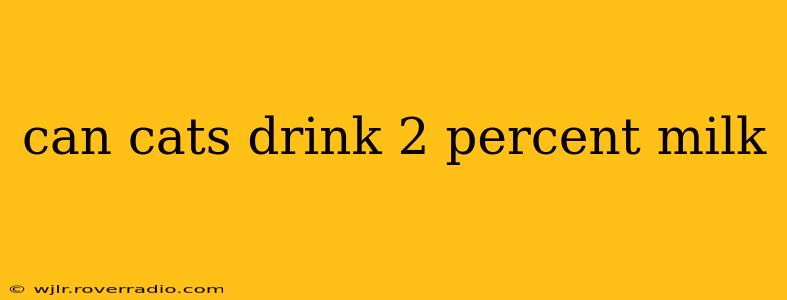Can Cats Drink 2% Milk? The Truth About Dairy and Feline Digestion
Many cat owners wonder if their furry friends can enjoy a little bit of milk, specifically 2% milk. The short answer is: generally no, cats shouldn't drink cow's milk, including 2% milk. While kittens may initially tolerate small amounts, adult cats often lack the enzyme lactase needed to digest lactose, the sugar in milk. Consuming milk can lead to digestive upset and other health problems.
Let's delve deeper into why this is the case and explore some frequently asked questions surrounding cats and dairy consumption.
Why Can't Cats Digest Milk?
Cats, unlike humans, are lactose intolerant. This means their bodies don't produce enough lactase, the enzyme responsible for breaking down lactose. When a cat drinks milk, the undigested lactose passes into the large intestine, where bacteria ferment it. This fermentation process can lead to several unpleasant symptoms.
What Happens When a Cat Drinks Milk?
The consequences of milk consumption in cats can vary, depending on the amount consumed and the individual cat's sensitivity. Common symptoms include:
- Diarrhea: This is one of the most frequent and noticeable reactions. The undigested lactose draws water into the intestines, resulting in loose or watery stools.
- Vomiting: This can also occur as the cat's body attempts to expel the indigestible lactose.
- Gas and Bloating: The fermentation of lactose in the gut produces gas, leading to discomfort and bloating.
- Stomach Cramps and Pain: The digestive upset caused by lactose intolerance can cause abdominal pain in cats.
Is 2% Milk Better Than Whole Milk for Cats?
No. The percentage of fat in the milk doesn't affect the lactose content, which is the main culprit behind the digestive problems. Whether it's whole milk, skim milk, or 2% milk, the lactose remains undigested in most adult cats, leading to the same undesirable symptoms.
What if My Cat Licks a Little Milk?
Occasional, tiny licks of milk are unlikely to cause significant problems for most cats. However, it's best to avoid offering milk intentionally. If your cat accidentally ingests a small amount, monitor them for any signs of digestive upset.
What Can I Give My Cat Instead of Milk?
Cats have specific nutritional needs. Instead of milk, provide your cat with fresh water as their primary source of hydration. If you're looking to supplement their diet with something special, consult your veterinarian. They can advise on appropriate treats and supplements tailored to your cat's age, breed, and health status. Many commercially available cat treats and foods are formulated to provide the nutrients they need.
My Kitten Seems to Tolerate Milk. Is It Okay?
Kittens may have a higher tolerance for lactose than adult cats due to their developing digestive systems. However, this tolerance usually diminishes as they mature. Even if your kitten appears to tolerate milk, it's best to transition them to a lactose-free alternative as they grow to prevent future digestive issues.
In conclusion, while the occasional tiny lick of milk might not harm your cat, it's best to avoid giving them any cow's milk, including 2% milk. Fresh water is the best hydration source for your feline friend, and consulting a veterinarian is always recommended for any questions about your cat's diet.
